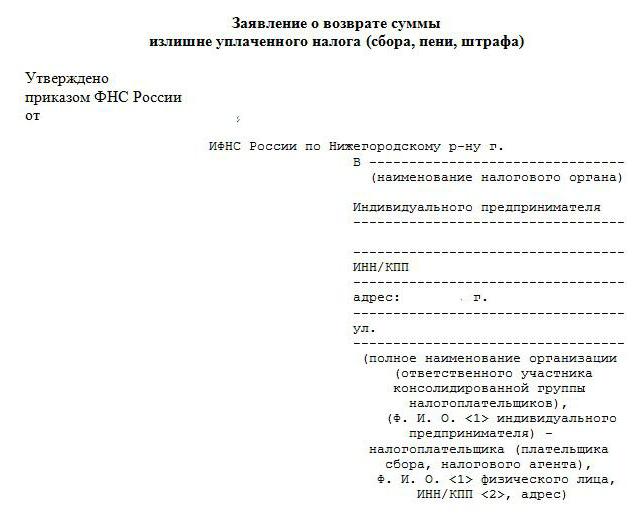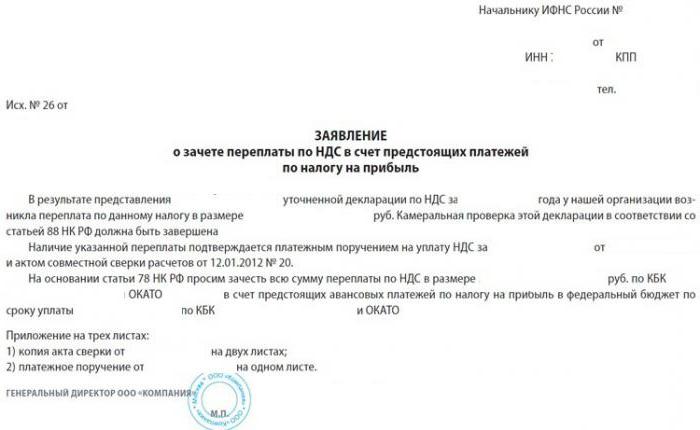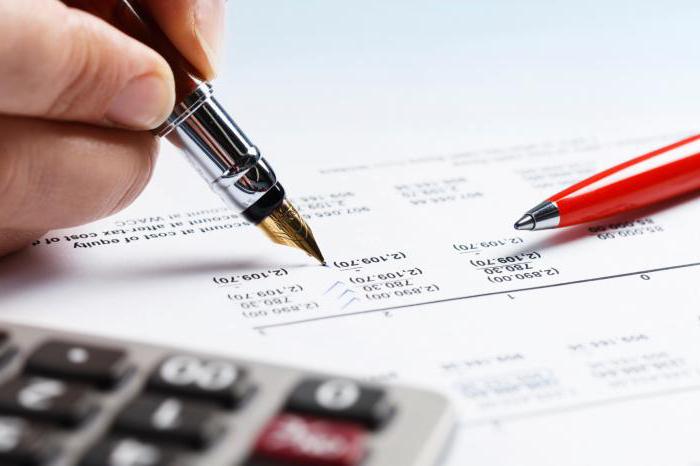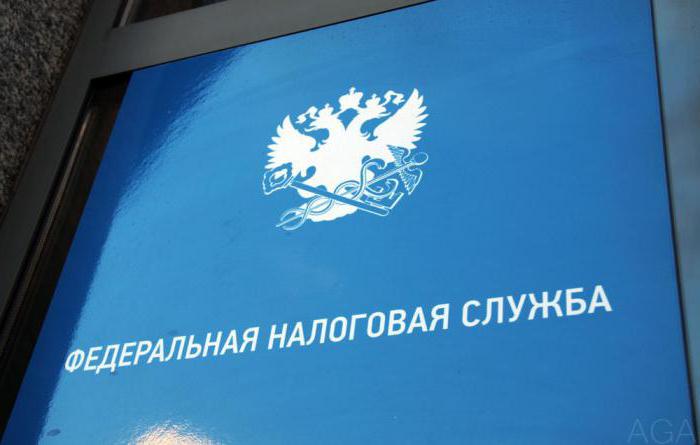Today we will be interested in the refund of tax overpayments. The terms of circulation, the causes of occurrence, the algorithm of actions in a particular case - all this will help clarify the situation. In Russia, sometimes people and organizations transfer too much money to the state treasury. This overpayment can be returned, but only after taking into account many features. What should every citizen know about the operation? How, when and where can I issue a refund? Answers to these questions will be presented later. Understanding all this is much easier than it sounds.
Where do tax returns
Where is a tax overpayment refund processed? It is from this question that we need to begin consideration of the topic under study. It’s no secret to anyone that overpayment in Russia is allowed to be returned to the taxpayer. To do this, you must act in accordance with the established rules. But about them later. 
Where to apply for a refund of excessively paid tax? Today, you can implement the idea through the following bodies and organizations:
- multifunctional centers;
- Departments of the Federal Tax Services of the country;
- portal "Public services".
Most often, the population and companies turn to the Federal Tax Service. So it is possible in the shortest possible time to regain the laid down funds.
Reasons for Overpayment
And when can the refund processing procedure come in handy? The reasons for this phenomenon may be different. Most often, a tax overpayment refund (statutes of limitations will be considered later) arises as a result of making too much money for:
- penalties;
- taxes
- fines;
- advance payments;
- tax fees.
For example, an organization may make a mistake in calculating the tax and transfer an amount that exceeds the real fee. Or, the amount of advance payments for the year exceeded taxes due at the end of the reporting period. In any case, if a citizen or organization transferred a lot of money for tax, they are allowed to return it. 
Nature of the request
How much is the period for the return of the overpayment of income tax or any other tax charge? Before talking about this, you need to find out what kind of algorithm of actions to adhere to implement ideas in life.
The nature of the overpayment refund is declarative. This means that the taxpayer himself must declare his right to a refund. While there is no application, money cannot be returned to a citizen or organization. This is a normal occurrence. If the taxpayer does not want to, he may not apply to the Federal Tax Service with a corresponding request.
No statement
What would happen in that case? There is nothing to be afraid of. It is not at all necessary to immediately issue a tax overpayment refund immediately after detecting an error. The terms of appeals of the population with this request can be called flexible. They allow you to think carefully about the solution.
If there is an overpayment on taxes, but there is no claim for a refund, then excess amounts will be credited to the same payment in the new tax period. In fact, a person will have to pay less in the future than usual in the form of tax. 
When it makes sense to apply for a refund
Based on the foregoing, we can conclude that it is not always a refund of overpayments for taxes (terms of treatment will be indicated later) must be issued. After all, extra money can be used as an advance for upcoming taxes, but only within the same payments. That is, with overpayment of personal income tax, the rest of the amount is allowed to be credited only to personal income tax for the next year, and nothing else. This is a normal occurrence.
Experts assure that making a refund of excessively paid tax makes sense only:
- with a significant overpayment;
- if a citizen / organization ceased to be a taxpayer in a particular area.
Thus, it is not always necessary to think about the implementation of the task. But if you want to issue a return, you will have to take into account many features of the process.
Action algorithm
In fact, everything is much simpler than it might seem at first glance. The refund of tax overpayments (the time allotted for this operation will be presented below) provides a simple algorithm of actions for the implementation of the task. 
The taxpayer must:
- Prepare a specific set of documents. About them will be discussed later.
- Write a refund request.
- Apply with collected documents to the Federal Tax Service at the place of registration. Give a statement with the prepared papers and wait for the decision of the tax authorities.
That's all. No more manipulations are needed. Simple, fast, clear. What else needs to be remembered about the studied process?
Money Transfer Term
For example, how much is the period for the repayment of overpayments on taxes of individuals or other fees?
According to the established rules, 1 month is allocated for a refund after making a decision on this operation. Within 30 days after the verification of the documents submitted by the applicant, the excessively paid tax should be transferred to the taxpayer. Otherwise, you can go to court to appeal the decision.
Duration of Review
What is the deadline for returning tax overpayment on application? How quickly should tax authorities check and transfer surplus payments to the taxpayer in an account?
This period is prescribed at the legislative level. The Tax Code of the Russian Federation states that the period for consideration of an application for the return of excessively paid tax is no more than 10 days. During this period, the tax authorities will decide on the transfer of funds, after which they will be transferred to the taxpayer. As mentioned above, the period during which excessively paid funds will be transferred is 30 days.
Experts believe that the established deadlines for the return of overpayments on taxes (legal entities and ordinary citizens) are small. They need to be increased. The Supreme Arbitration Court of the Russian Federation believes that the period for consideration of an application for a refund of taxes should be increased.
YOU Position
What for? And then, how long should the duration of processing a refund to a taxpayer be?
The SAC of the Russian Federation is of the opinion that the overpayment arises as a result of a tax return filed by a citizen or organization. To make the right decision on a refund, you need to conduct a thorough check. Especially in relation to legal entities.
This is a desk audit. Then the refund of tax overpayment terms will have increased to 4 months. About 3 months are allowed for a desk audit by tax authorities. Plus the month allotted to the transfer of money to the applicant. Only after this period the taxpayer will be able to appeal the decision made by the tax authorities. 
Limitation period
The statute of limitations for the return of tax overpayments plays an important role. He is interested in all citizens and all organizations that transferred too much money to the state. How fast should a taxpayer request a refund?
The statute of limitations for such appeals in Russia is 3 years. This means that the return of excessively paid taxes is allowed within 36 months.
More precisely, the countdown begins:
- from the moment of filing a tax return with the Federal Tax Service - upon VAT overpayment, as well as if you want to return advances for the year;
- after making money to the state treasury - if there is an overpayment due to errors.
As soon as 3 years pass, the citizen loses the right to reimburse the excessively paid tax. It will be credited against new payments. There is nothing difficult to understand in this. It is recommended not to delay this process and apply for tax overpayments as soon as possible.
Statement
What does a tax refund application look like? A sample of this document is presented above. Compiling it, as a rule, is not so difficult. The main thing is to remember the rules of conducting business correspondence and the principles for processing business letters / appeals. Then it will be very simple to make a written request for a refund of extra money for a tax.
The mentioned document may look something like this:
I, (name of taxpayer), (data from the passport), please transfer to my bank account the excessively paid tax (type of tax). I (money transfer date) transferred money in the amount (amount) of tax (type of tax payment). After a thorough check of the payment, it turned out that the overpayment is (refund amount). I ask you to transfer money according to the following details: (account details).
But you can get by with a simpler application form. For example, this:
I, (taxpayer data), please return the overpayment for (type of tax) for (year) and transfer the funds to the account: (details).
We can say that the application for the return of tax overpayment is actually drawn up in free form. The main thing is that this document expresses the purpose of the citizen / organization's appeal, and also has information about the bank account necessary for crediting the taxpayer with money.
Documents
From now on, it is clear what to do if you need to arrange a refund of the overpayment of taxes. The timing of the appeal of the population with this request is also not a mystery. And what can be useful at the time of filing the relevant application? 
It is recommended to attach to it:
- identification;
- Payments confirming the payment of tax;
- details of the applicant’s account (they are written directly in the application);
- TIN;
- certificate of registration (for organizations);
- tax return;
- documents establishing the need to pay tax (for example, certificates of employee income or a contract of sale of real estate, evidence of ownership of the property).
The citizen no longer needs any documents. Copies must be attached to the listed securities. It is recommended that you check with the Federal Tax Service for more accurate information about the documents requested when checking the correctness of tax payments. There they will be able to give full information on each payment to citizens, and organizations, and legal entities. What are the deadlines for returning overpayments on personal taxes? Exactly the same as with organizations.
Which Federal Tax Service to go to
Where exactly is the tax overpayment refunded? A sample statement was presented earlier. As already mentioned, you can issue a refund through the Federal Tax Service.
Which department should I contact? Legislation indicates that a deduction is provided to any FTS that maintains tax records of an organization or citizen. In other words, all tax divisions in which the taxpayer is registered with the taxpayer are required to accept applications for refunds for excessively paid taxes or fees.
Thus, when registering a subsidiary, you can apply with the following requests:
- at the place of registration of the organization;
- to the Federal Tax Service, in which the head office of the company is registered.
In the case of individuals, it is customary to submit an application to the tax department at the place of registration or temporary residence of a citizen. If a person is not tax registered in a particular locality, he cannot demand a refund through third-party FTS for overpaying taxes or fees.
Summary and Conclusions
Now the deadline for repaying the overpayment on income tax or on any other payments is clear.In addition, today we got acquainted with the actions necessary for the taxpayer to be returned with excessively paid tax. 
This operation is a personal desire of the taxpayer. He can either return the surplus money transferred as a tax, or set off the funds against future payments. In order not to wait for 3 years, you can write a statement on the offset of excessively paid funds. At the same time, it is important to remember that overpayments for federal taxes are counted only against federal payments, and for regional taxes to regional ones. The tax authorities do not make any exceptions.
In fact, the refund of tax overpayments has the same statute of limitations as the bulk of requests to the tax authorities. A citizen or company will have 3 years to apply. After the expiration of this period, all inquiries to the tax regarding the return of overpayments will not take place.
In practice, refusal to issue a return by tax authorities is practically not accepted. If a citizen is groundlessly decided not to provide the money laid to him, you can go to court. It also takes 3 years. Also, overpayment can be considered a bad debt. In real life, such cases are almost never found. The deadline for returning tax overpayments on application is no longer a mystery.